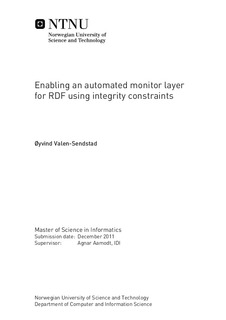| dc.contributor.advisor | Aamodt, Agnar | nb_NO |
| dc.contributor.author | Valen-Sendstad, Oyvind | nb_NO |
| dc.date.accessioned | 2014-12-19T13:41:13Z | |
| dc.date.available | 2014-12-19T13:41:13Z | |
| dc.date.created | 2014-04-24 | nb_NO |
| dc.date.issued | 2011 | nb_NO |
| dc.identifier | 714009 | nb_NO |
| dc.identifier | ntnudaim:5822 | nb_NO |
| dc.identifier.uri | http://hdl.handle.net/11250/253656 | |
| dc.description.abstract | The Semantic Web has introduced several innovations to the existing field of Integrated Operations and sparked a shift in the development of the ISO 15926 standard. Industries that want to implement ISO 15926 need to preserve a high level of data quality while opening for free data exchange with its peers. The ISO 8000 standard defines three important concepts that define data quality, namely; syntax, semantic and pragmatic data quality - which has been used as a measure. The existing tools and methods is currently not capable of performing the required level of data validation. A new approach has recently been suggested that uses a method of hybrid reasoning to validate data by applying a local Closed World Assumtion (CWA). This enables the possibility of augmenting the ISO 15926 Ontology with Integrity Constraints (IC) where data dependencies needs to be expressed. The work of this thesis shows that the IC approach is applicable to the fundamental Life-cycle dependency of ISO 15926. | nb_NO |
| dc.language | eng | nb_NO |
| dc.publisher | Institutt for datateknikk og informasjonsvitenskap | nb_NO |
| dc.title | Enabling an automated monitor layer for RDF using integrity constraints | nb_NO |
| dc.type | Master thesis | nb_NO |
| dc.source.pagenumber | 100 | nb_NO |
| dc.contributor.department | Norges teknisk-naturvitenskapelige universitet, Fakultet for informasjonsteknologi, matematikk og elektroteknikk, Institutt for datateknikk og informasjonsvitenskap | nb_NO |

